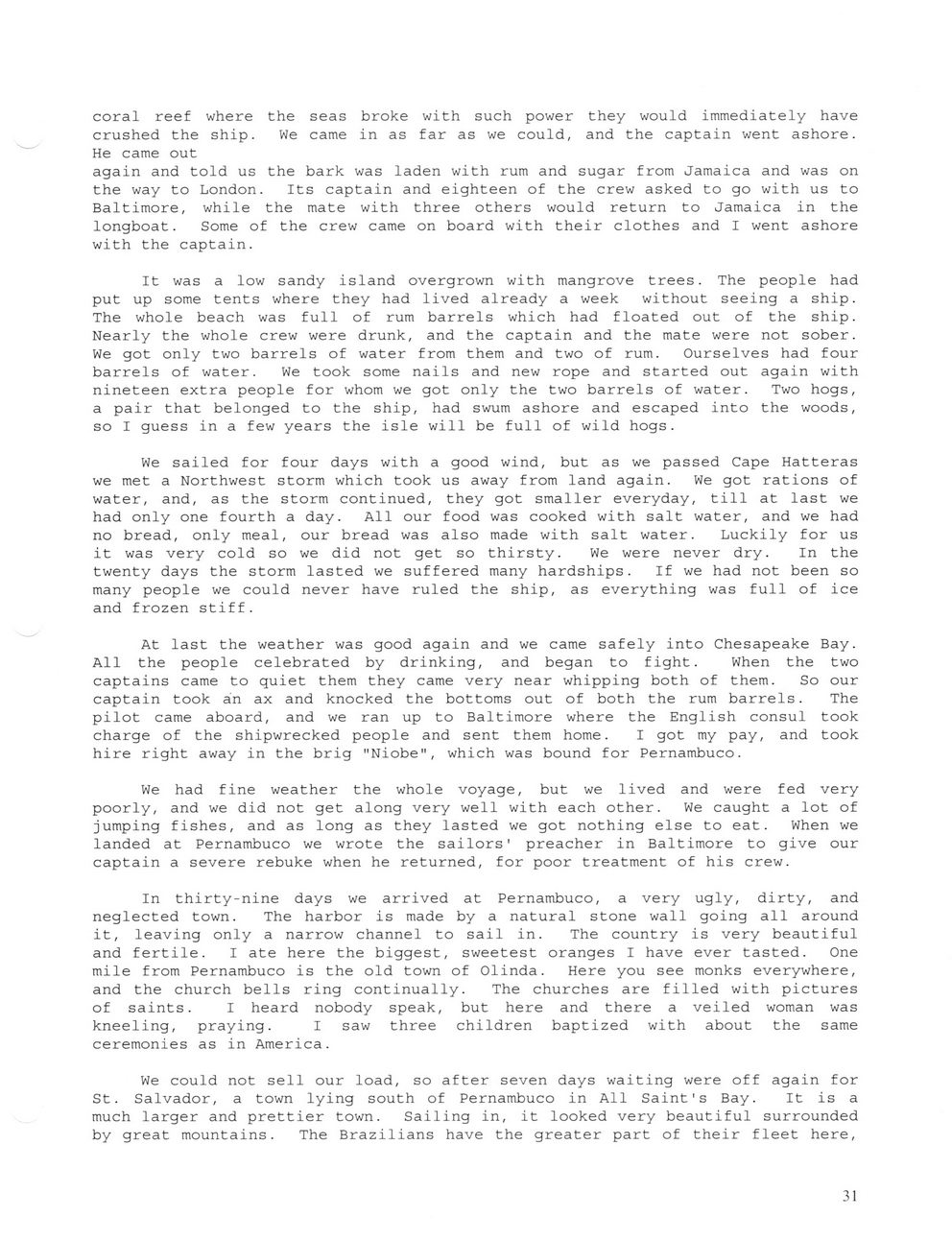This text was obtained via automated optical character recognition.
It has not been edited and may therefore contain several errors.
coral reef where the seas broke with such power they would immediately have crushed the ship. We came in as far as we could, and the captain went ashore. He came out again and told us the bark was laden with rum and sugar from Jamaica and was on the way to London. Its captain and eighteen of the crew asked to go with us to Baltimore, while the mate with three others would return to Jamaica in the longboat. Some of the crew came on board with their clothes and I went ashore with the captain. It was a low sandy island overgrown with mangrove trees. The people had put up some tents where they had lived already a week without seeing a ship. The whole beach was full of rum barrels which had floated out of the ship. Nearly the whole crew were drunk, and the captain and the mate were not sober. We got only two barrels of water from them and two of rum. Ourselves had four barrels of water. We took some nails and new rope and started out again with nineteen extra people for whom we got only the two barrels of water. Two hogs, a pair that belonged to the ship, had swum ashore and escaped into the woods, so I guess in a few years the isle will be full of wild hogs. We sailed for four days with a good wind, but as we passed Cape Hatteras we met a Northwest storm which took us away from land again. We got rations of water, and, as the storm continued, they got smaller everyday, till at last we had only one fourth a day. All our food was cooked with salt water, and we had no bread, only meal, our bread was also made with salt water. Luckily for us it was very cold so we did not get so thirsty. We were never dry. In the twenty days the storm lasted we suffered many hardships. If we had not been so many people we could never have ruled the ship, as everything was full of ice and frozen stiff. At last the weather was good again and we came safely into Chesapeake Bay. All the people celebrated by drinking, and began to fight. When the two captains came to quiet them they came very near whipping both of them. So our captain took an ax and knocked the bottoms out of both the rum barrels. The pilot came aboard, and we ran up to Baltimore where the English consul took charge of the shipwrecked people and sent them home. I got my pay, and took hire right away in the brig "Niobe", which was bound for Pernambuco. We had fine weather the whole voyage, but we lived and were fed very poorly, and we did not get along very well with each other. We caught a lot of jumping fishes, and as long as they lasted we got nothing else to eat. When we landed at Pernambuco we wrote the sailors1 preacher in Baltimore to give our captain a severe rebuke when he returned, for poor treatment of his crew. In thirty-nine days we arrived at Pernambuco, a very ugly, dirty, and neglected town. The harbor is made by a natural stone wall going all around it, leaving only a narrow channel to sail in. The country is very beautiful and fertile. I ate here the biggest, sweetest oranges I have ever tasted. One mile from Pernambuco is the old town of Olinda. Here you see monks everywhere, and the church bells ring continually. The churches are filled with pictures of saints. I heard nobody speak, but here and there a veiled woman was kneeling, praying. I saw three children baptized with about the same ceremonies as in America. We could not sell our load, so after seven days waiting were off again for St. Salvador, a town lying south of Pernambuco in All Saint's Bay. It is a much larger and prettier town. Sailing in, it looked very beautiful surrounded by great mountains. The Brazilians have the greater part of their fleet here, 31

Koch, Christian Diary-31